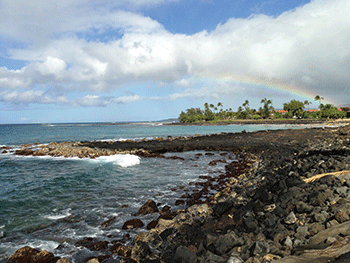Were you told, as I was, that there was a pot of gold at the end of the rainbow? I once set out, as a little boy, trudging on my little legs, to find the pot of gold. But no sooner did I get off our yard than my mother came and marched me back home. And when I looked over my shoulder, the rainbow had disappeared. There went my gold.
By Louis Lotz
Were you told, as I was, that there was a pot of gold at the end of the rainbow? I once set out, as a little boy, trudging on my little legs, to find the pot of gold. But no sooner did I get off our yard than my mother came and marched me back home. And when I looked over my shoulder, the rainbow had disappeared. There went my gold.
For thousands of years the whole human race looked at rainbows with eyes of wonder. Then, in 1611, Marco de Dominis, a Catholic archbishop and scientist, published a treatise on the origin of rainbows. He said a rainbow is merely the refraction of light by droplets of water suspended in the air. And there went the magic.
Which is too bad, because when it comes to rainbows, we don’t want to become so scientific that we obscure a deeper truth: in the Bible the rainbow symbolizes the solemn promise of God that life will go on. In Genesis, after the great flood, when the waters finally receded, God drapes a rainbow across the sky as a sign of his promise to never again destroy all living things.
But what does God’s promise mean in our kind of world, where, as never before, humankind has the ability to ruin the planet and destroy itself? Have the invention and the proliferation of nuclear weapons, and chemical and biological weapons of mass destruction, rendered null and void the solemn promise of God?
Living in our kind of world, what are we to make of God’s promise that life will always go on? It would be wrong, I think, to use the rainbow as an excuse for irresponsibility, to think that no matter how reckless we become, God won’t let us destroy ourselves, or ruin this planet.
We know better than that. God does not curtail human freedom. From the Holocaust to Rwanda to present-day Syria, God does not intervene and stop people from doing wrong. God warns us. God sends us the prophets, and even his son. But God also gives us the freedom to stone the prophets, disregard the warnings, ignore his commandments, and crucify his son.
In the New Testament, in Revelation, the rainbow appears again. John has a vision of God seated on a throne, “…and round the throne was a rainbow” (4:3). How about that: God is wrapped in a rainbow, clothed in his covenant promise. Which I take to mean that God’s promise still stands—life will go on. We can wreck creation, but God won’t.
My dream is that the nations that possess weapons of mass destruction will recognize that we are all standing at the edge of an abyss. My dream is that we’ll all take a step backwards, and that slowly we will all reduce the size of our nuclear stockpiles. We will do this because we recognize that what is too terrible for God to do is too terrible for us to do. And in my imagination, when the last nuclear weapon has been disassembled, there will appear in the sky a great big rainbow.
Trillions of dollars spent on weaponry will now be available to rebuild our cities and retool our industries, and to make health care and education available to everyone.
There really is a pot of gold at the end of the rainbow.
Louis Lotz is pastoral leader of Central Reformed Church in Grand Rapids, Michigan.





